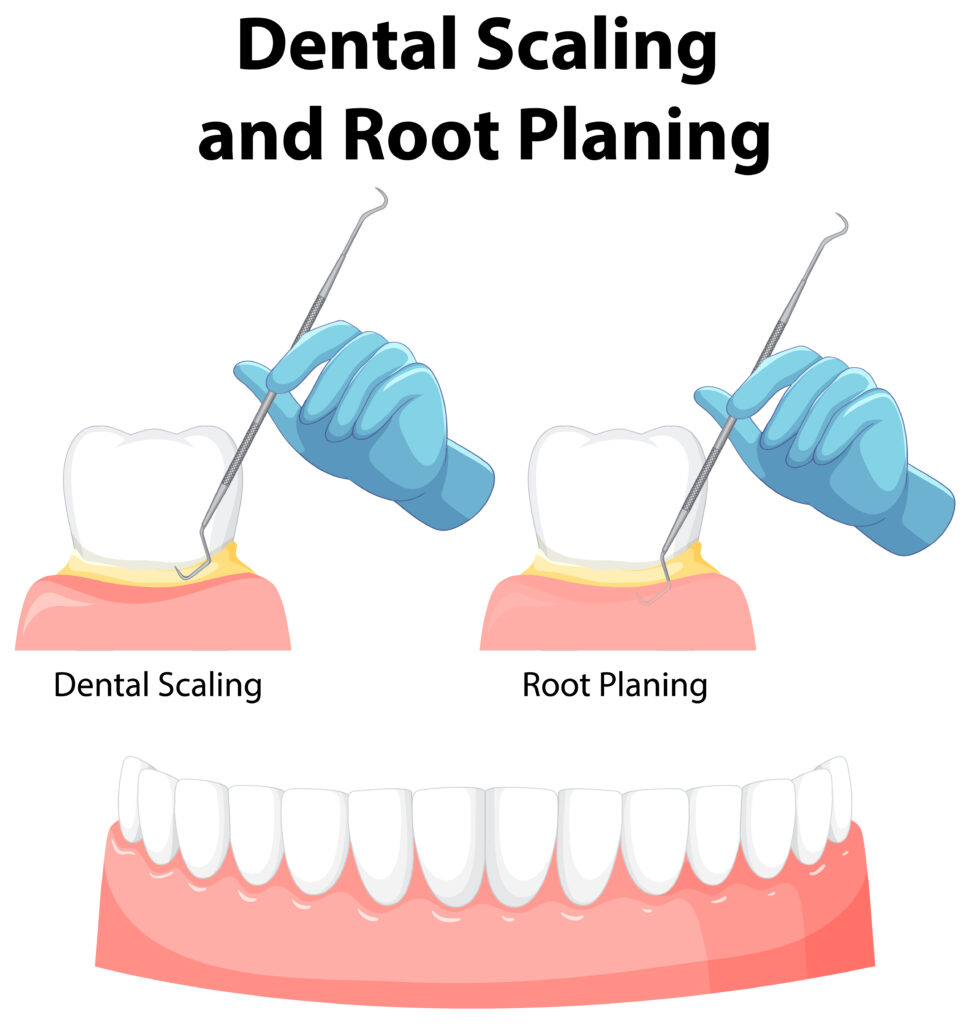Scaling and Root Planing

Restoring Gum Health with Deep Cleaning
Scaling and root planing, often referred to as a deep cleaning, are essential dental procedures designed to address gum disease, also known as periodontal disease. These treatments are performed by dentists or dental hygienists and play a crucial role in the management of gum disease. Scaling focuses on the removal of plaque and tartar buildup from tooth surfaces and below the gumline, while root planing involves smoothing the tooth’s root surfaces. Together, these procedures promote gum healing and prevent the progression of gum disease, which, if left untreated, can lead to tooth loss.
Understanding Gum Disease:
Gum disease is a common dental condition characterized by inflammation of the gum tissues and potential damage to the structures that support your teeth, including bone. It typically begins with the accumulation of plaque, a sticky film of bacteria, on tooth surfaces. Over time, if not adequately removed through regular oral hygiene practices, plaque hardens into tartar (calculus), leading to gum inflammation and, in more severe cases, the formation of pockets between the teeth and gums.
The Scaling and Root Planing Process:
Scaling and root planing are comprehensive procedures that aim to restore gum health and prevent the progression of gum disease:
- Assessment: Your dentist will assess your gum health and the extent of gum disease through a thorough examination, including measuring the depth of gum pockets.
- Anesthesia: To ensure your comfort, the dentist may use local anesthesia to numb the treatment area.
- Scaling: During the scaling phase, specialized dental instruments are used to remove plaque and tartar from the surfaces of your teeth and beneath the gumline. This meticulous process helps eliminate bacteria and promotes gum healing.
- Root Planing: Root planing involves smoothing the rough surfaces of tooth roots. This step aims to deter the future accumulation of plaque and tartar, as a smoother surface is less conducive to bacterial attachment.
- Antibacterial Rinse: An antibacterial mouth rinse may be prescribed to further control bacteria and promote healing.
- Follow-Up: After the procedure, your dentist will schedule follow-up appointments to monitor your gum health and ensure that healing is progressing as expected.
Benefits of Scaling and Root Planing:
- Gum Health: Scaling and root planing are effective in treating gum disease, reducing inflammation, and promoting gum healing.
- Prevention: These procedures prevent the progression of gum disease, which, if left untreated, can lead to tooth loss.
- Improved Oral Health: Gum disease treatment can contribute to improved overall oral health, as it reduces the risk of complications.
- Preservation of Teeth: By addressing gum disease promptly, scaling and root planing help preserve your natural teeth.
Maintenance and Follow-Up:
Maintaining good oral hygiene practices at home, including regular brushing and flossing, is essential to support the success of scaling and root planing. Your dentist will provide guidance on proper oral care and schedule periodic follow-up visits to monitor your gum health.
In summary, scaling and root planing are vital procedures for addressing gum disease and preserving your oral health. By seeking timely treatment and maintaining good oral hygiene, you can enjoy the benefits of healthy gums and a strong, natural smile. If you have concerns about gum disease or are recommended for scaling and root planing, consult with your dentist to understand the procedure and its significance in your oral care journey.


